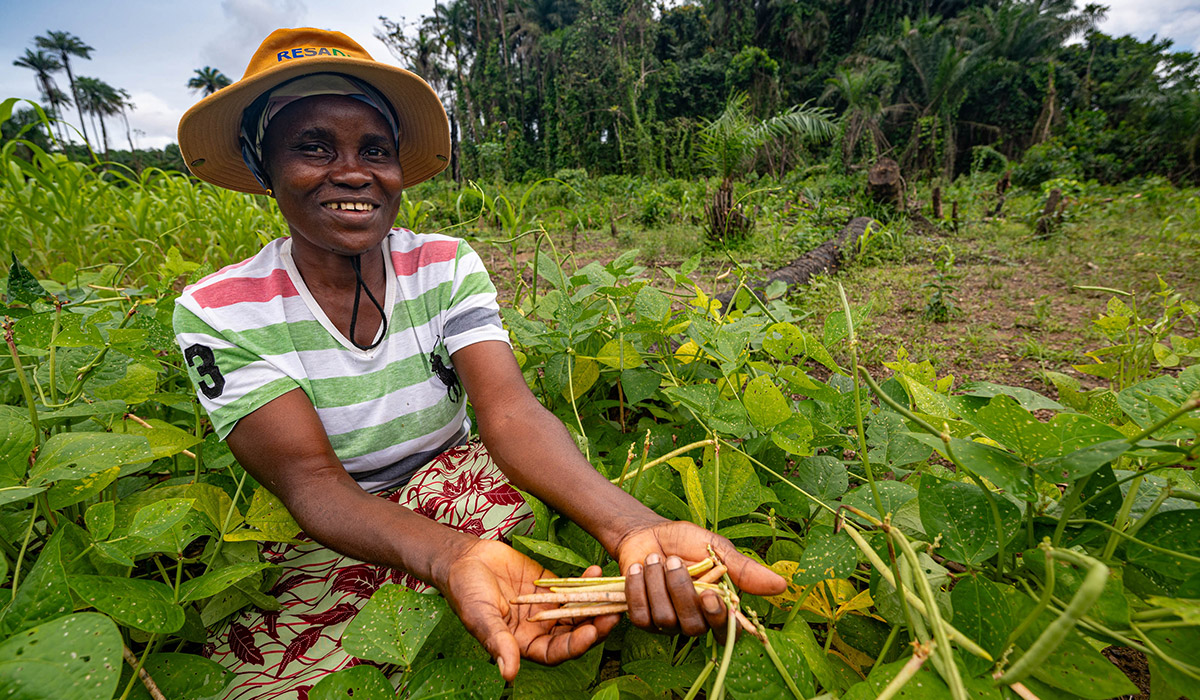From Fields to Bakeries: How Liberian Farmers Are Transforming Cowpeas into Profits

For generations, the members of the Rise and Shine Multipurpose Cooperative in Grand Bassa County, Liberia, have cultivated cowpeas, yet they never realized their crop could serve as a viable substitute for wheat flour.
Despite the widespread availability of locally grown cowpeas, Liberia remains heavily dependent on imported wheat, increasing costs and limiting accessibility. To address this gap, food processing specialists from Liberia’s Central Agricultural Research Institute (CARI) introduced cooperative members to an innovative solution: processing cowpeas into flour. Through specialized training, farmers learned how to transform their harvest into nutritious and versatile pastries, including cakes, cookies, and sausage rolls—unlocking new opportunities for food security and economic empowerment. “Many smallholder farmers in Liberia have reduced incomes since they are not able to add much value to the crops they sell,” said Dr. James S. Dolo, a senior research officer at CARI. “The farmers sell unprocessed produce to the market and get paid the market rates for those products. That doesn’t generate much profit.”
Recognizing the need to enhance farmers’ economic opportunities, the CARI team launched a series of train-the-trainer workshops, equipping members of the Rise and Shine Multipurpose Cooperative with the skills to add value to their crops and boost their incomes. As part of this initiative, a food processing workshop was conducted to build the farmers’ capacity—both for immediate benefits and long-term sustainability. During these hands-on sessions, participants mastered the art of creating cowpea-based products, including cowpea soup, cowpea bread, cowpea cake, rice porridge, cowpea sausage rolls, and rice bread, expanding their potential for market-driven success.
These workshops form a key component of the “Improving Agricultural Resilience to Salinity through Development and Promotion of Pro-Poor Technologies” (RESADE), a long-term initiative aimed at strengthening agricultural resilience in salt-affected regions. Led by the International Center for Biosaline Agriculture (ICBA), RESADE collaborates with national agricultural research systems in Botswana, The Gambia, Liberia, Mozambique, Namibia, Sierra Leone, and Togo to enhance agricultural productivity, food security, and rural incomes, with a special focus on empowering women farmers.
RESADE is implemented in partnership with the International Fund for Agricultural Development (IFAD) and the Arab Bank for Economic Development in Africa (BADEA).
“The RESADE project works to mitigate the effects of salinity on arable land by introducing salt-tolerant crops and best agronomic management practices to farmers in the project areas,” said Dr. Nhamo Nhamo, a senior agronomist at ICBA and a member of the RESADE team. “It also helps farmers develop value chains for introduced cropping systems, which is what the project is doing in Grand Bassa.”
Cowpea (Vigna unguiculata) is well known to the farmers of Grand Bassa county. It’s the second most widely grown grain legume in Africa after the groundnut.
“There are two reasons why cowpea is so grown in Liberia,” said Dr. James S. Dolo. “It’s packed full of nutrition, and it’s a perfect match for climates and soils here.”
Cowpea is a nutritional powerhouse and a staple food for nearly 200 million people across sub-Saharan Africa, providing a critical source of protein, essential nutrients, and digestible carbohydrates. Its high-energy content is comparable to that of cereal grains, making it an invaluable dietary component in regions where food security is a pressing concern. Additionally, certain cowpea varieties have the advantage of quick cooking times, a crucial benefit in areas where fuelwood is scarce and costly.
Beyond its nutritional value, cowpea plays a vital role in soil health and sustainability. As a leguminous crop, it naturally fixes nitrogen from the air, enriching the soil and enhancing fertility—allowing it to support healthier plant growth and improve overall crop yields.
“We wanted to help farmers add more value to the cowpeas they produced,” said Dr. James S. Dolo. “So we taught them how to make breads using cowpea flour.”
The members of the Rise and Shine Multipurpose Cooperative eagerly embraced the innovation, recognizing its potential for both nutrition and income generation. They not only began producing cowpea bread using the techniques they had learned but also took it a step further—adapting and enhancing the recipe to better suit local tastes and preferences. “We improvised by adding banana for a bit more flavor,” said Ms. Nancy Bryant, the cooperative’s chair. And that addition was a big success. “Now we sell it to the students at the local community college.”
By adding value to the cowpeas growing in their fields, the members of the Rise and Shine Multipurpose Cooperative can hope for a new revenue stream for their households.